2011 - 2012
2011-2012 Religious Life Lecture Series
“Ecclesia Semper Reformanda”
The Church Always Being Reformed
Thursdays at 7:30PM in Elizabeth A. "Bessie" Labatt Hall
(King's University College, London)
In 1962 Blessed John XXIII announced his plans for the Second Vatican Council. The ageing pontiff summed up his intentions when he said: “I want to throw open the windows of the church and let the Spirit of God blow through and cause a rebirth of the Church.”
This year’s lecture series examines the primary documents of the Council from diverse perspectives and through a choir of voices.
“Let it be recognized that all the faithful, whether clerics or laity, possess a lawful freedom of inquiry, freedom of thought and freedom of expressing their mind with humility and fortitude in those matters on which they enjoy competence.” (The Pastoral Constitution on the Church in the Modern World, 52)
The work of The Council continues as members of the Church discern how best to proclaim Christ’s victory over sin and death in a world so often scarred by discord and enmity.
We move forward in hope.
Join us as we seek to be challenged, provoked, and encouraged to embrace the vision of those that have gone before us.
Thursday, September 29, 2011
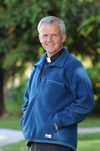 Reverend John McCarthy, S.J.
Reverend John McCarthy, S.J.
Chaplain, St. Mark’s College, University of British Columbia
This lecture attempts to develop a theological response to the experiential tension of awe and lament in contemporary culture. Why should Christianity concern itself with the natural world when it seems that the Christian faith concerns itself solely with the salvation of the human person, or more particularly, with the salvation of the human soul? The lecture will be grounded in the conviction that matter really does matter for Christianity.
BIO:
John McCarthy, SJ is a member of the Jesuits in English Canada. He received a BscFor (Forest tree biology) from the University of New Brunswick, a MS (soil science) from the University of Florida, and a PhD (boreal forest ecology) from the University of British Columbia. John is currently Chaplain of the University of British Columbia and teaches a course in ecological theology at St. Mark’s College on the UBC campus. He is active in forest conservation policy, having served as Chair of the NL government Wilderness and Ecological Reserves Advisory Council for eight years. He was the recipient of the 2002 Canadian Environment Awards Gold Medal (Lands and Forests category) for his work in boreal forest conservation in Newfoundland.
Thursday, October 13, 2011
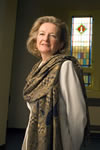 Sister Miriam Martin, PBVM
Sister Miriam Martin, PBVM
Associate Professor, Saint Paul University, Ottawa
A New Dreaming, the Ancient Seeking: LivingReligious Life since Vatican II
Vatican II’s call for the refounding of Religious Life set in motion an adventure of large proportions for many congregations of women religious. The adventure has been bearing fruit in a variety of ways for almost fifty years. As that journey continues here in Canada numerous congregations have been responding to a further call for reframing their missions through a challenge placed before them by Thomas Berry, OP. In his words: “the time has come when the single greatest service that women religious could make to the larger destinies of the human, the Christian and the Earth community would be the recovery of our human and Christian intimacy with the spontaneities of all those wonderful participants in the universe of being.” Thomas Berry, Women Religious: The Voice of the Earth, UISG Bulletin, #95 (Summer ’93) “Evangelization, New Challenges.” This lecture will explore changes in religious life since Vatican II and seek to understand how some religious are responding with fidelity to the gospel in light of the New/Ancient Story.
BIO:
Miriam K. Martin has worked in religious education in a variety of ways throughout her adult life. She is presently the director of the Religious Education Programs in the Faculty of Theology and St. Paul University and is the coordinator of the Programs in Practical Theology. In 2007 she was awarded the LIFT Award for excellence and leadership in university teaching. She continues to find the Faculty of Theology and St. Paul University to be a creative and supportive environment for the work of religious education, catechesis and faith formation. As a singer, song writer Miriam’s passion for faith formation also echoes the growing concerns that exist between education in faith and eco-theology and social justice.
Sponsored by the Sisters of St. Joseph of London
Thursday, October 27, 2011
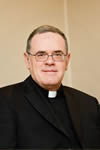 Reverend Gordon Rixon, SJ
Reverend Gordon Rixon, SJ
Associate Professor, Systematic Theology, Regis College, Toronto
This presentation and lecture will welcome the Heritage Edition of the St. John’s Bible to our campus. The Heritage Edition of the St. John’s Bible was commissioned by St. John’s Abbey in Collegeville and is a work of great simplicity and beauty. Only 299 copies of this bible have been printed. The bible was entrusted to Regis College by the Allen family and who wished that it could be shared with many of our sister colleges across Canada.
BIO:
Gordon Rixon, SJ is a specialist in the work of Bernard Lonergan studies, systematic theology, and the relation of mysticism and co-developmental (personal, cultural, social and ecological) transformation. He is present working on a manuscript entitled Transforming Mysticism: Reintroducing Ignatius of Loyola and Bernard Lonergan. He has been a resident scholar at Massey College at the University of Toronto and the Institute for Ecumenical and Cultural Research at St. John’s University, Collegeville, Minnesota. He represents the Canadian Catholic Bishops on the Churches Council on Theological Education.
Thursday, November 3, 2011
 By mandate of Bishop Ronaldo Fabbro, CSB, Bishop of London, this Religious Life Lecture event has been cancelled.
By mandate of Bishop Ronaldo Fabbro, CSB, Bishop of London, this Religious Life Lecture event has been cancelled.Therese Koturbash, BA, LLB
International Coordinator Womenpriests, University of London
In his encyclical, “Pacem in Terris (1630) Pope John XXIII observed the women’s movement as one of three significant signs of the time. There he wrote, (s)ince women are becoming ever more conscious of their human dignity, they will not tolerate being rerated as more material instruments, but demand rights befitting human persons both in domestic and in public life.”
When considering the great equality given to all Christians by virtue of their baptism and through a reflection on Lumen Gentium and the Code of Canon Law, what do the late Pope’s words mean for the Church at the beginning of the 21st century?
BIO:
In her biography, Therese Koturbash turns to the writings of St. Augustine: “Hope has two beautiful daughters: their names are anger and courage. Anger that things are the way they are. Courage to make them the way they ought to be.” A Ukrainian Catholic by grace of baptism, a civil lawyer by profession, soon to complete graduate studies in Canon Law and actively engaged in the works of justice in Canada, Koturbash’s participation as an Election Observer in the Ukrainian election of 2004 began her new work. There she saw people engaged in the work of reform, because they loved their country and wanted something better for their children and their children’s children. Therese serves as the International Coordinator for Womenpriests.org, an organization of faithful Catholics who work within the parameters of canon law to raise awareness form the points of view of scripture, theology and tradition to welcome women into all positions of Church leadership.
Thursday, November 17, 2011
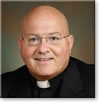 Most Reverend Brian Joseph Dunn, DD
Most Reverend Brian Joseph Dunn, DD
Bishop of Antigonish, NS
In this lecture, we shall consider the liturgy as an expression of how the Church is always being reformed (Ecclesia Semper Reformanda). The Second Vatican Council called for major changes to the liturgical rites of the Church. These changes were introduced so that our faith could be expressed and strengthened, that worship might be offered to God and that our sanctification can be brought about (Sancrosanctum Concilium, nn. 6-7). In light of these changes, we will reflect on these goals of the liturgy by considering the principles of active participation, community celebrations of worship, the translation of liturgical texts including the new Roman Missal, and the liturgy’s contribution to our sanctification.
BIO:
Bishop Brian Joseph Dunn is a native of St. John’s Newfoundland. After studying at Memorial University of Newfoundland for one year, he attended King’s University College in London Ontario and received his Bachelor of Arts degree from The University of Western Ontario in 1976. He completed his seminary formation at St. Peter’s Seminary and was ordained in August of 1980. He was involved in post-graduate studies and received a Licentiate (1990) and a Doctorate (1991) in Canon Law. He completed a Masters in Theology (Liturgical Studies) in 2006. Besides his pastoral ministry in parishes in Atlantic Canada, he served as Vice-Chancellor and as Associate Judicial Vicar of the Marriage Tribunal. From 2002 to 2008 he served on the faculty at St. Peter’s Seminary, London and taught a variety of courses in Canon Law, Ecumenism, Ecclesiology, and Liturgical Law. He was ordained bishop in 2008, and serviced as one of the Auxiliary Bishops of the Diocese of Sault Ste. Marie. On January 25, 2010 he was installed as the Bishop of the Diocese of Antigonish.
Annual Christ the King Lecture
Sponsored by St. Peter’s Institute for Catholic Formation
Thursday, January 12, 2012
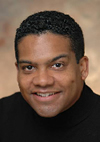 Damon Owens
Damon Owens
Theology of the Body Institute, PA
Sharing his own experiences as a father, spouse, and child of God, Damon’s presentation will draw people into the mystery of God’s plan and help them dive deep into the richness of the church’s teaching on sexuality.
BIO:
Damon Owens is the founder of Joy-Filled Marriage New Jersey, a non-profit organization providing training, resources, and support for engaged and married couples. In 2005, he introduced a new marriage programme in the State of New Jersey; God’s Plan by Christopher West and based on the Theology of the Body. Damon and his wife Melanie have been teaching and promoting Natural Family Planning since 1993.
Thursday, January 26, 2012
**7:00 – 9:00PM**
 Jesse Manibusan
Jesse Manibusan
2 by 2 Ministries, TX
One of the goals of the Second Vatican Council was to simply explore ways in which the Church could learn from the past, and respond better in the work of the mission of Jesus. Pope Paul VI spoke about the role of young people living their faith passionately and leading the church boldly. Each generation takes its turn in living and passing along the torch of faith. Our generation is no different. Come and be the women and men that God wants us to be; living in the boldness and compassion of Christ; taking our turn in bringing the kingdom of God closer and closer. Through music, scripture and story telling come and explore what it means to live in Christ as a young adult in the world today.
BIO:
Jesse Manibusan is a dynamic eclectic speaker and musician who shares from his heart the love of Christ and the call to live our lives from our baptismal promises - - in other words, live in Christ! Jesse is a familiar presence at diocesan and national conferences throughout the U.S.A. and Canada, including the Los Angeles Religious Education Congress, the National Catholic Youth Conference (NCYC), World Youth Day Life Teen events and many others. He also conducts parish missions and retreats at numerous schools, colleges and universities around the country. Jesse completed a master’s degree in multicultural ministries from the Franciscan School of Theology in Berkeley, California. He and his wife, Jodi, are the founders of 2 by 2 Ministries, a grass roots outreach of music, storytelling and service.
Thursday February 9, 2012
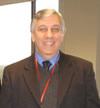 Reverend James Puglisi, SA
Reverend James Puglisi, SA
Minister General of the Franciscan Friars of the Atonement
Professor of Theology, Pontifical University of St. Thomas Aquinas “Angelicum,” Rome, Italy
This lecture will illustrate the innovative teaching of the Second Vatican Council concerning the search for Christian unity, and for a positive relationship with other religions. We will look at the relationship between theory and practice in the process of reception of the Council. As applied to the area of inter-religious relations, one may observe that, while at the universal level of the Catholic Church, it appears that the church has been actively engaged in interreligious dialogue, especially with the publication of a number of important documents, the work of interreligious relations on the level of the local churches is quite lacking. The lack of education about religion, and the ignorance among the faithful, may be seen especially in the reactions of the faithful to other religions after 9/11. Finally, we look at some practical challenges in terms of education, especially on the level of higher education for improving the reception of the Council’s teaching.
BIO:
Professor James F. Puglisi, SA is the Fellow and Francis Joseph Cardinal Spellman Professor of Catholic Theology. He holds a BA in Sociology and an MA/STL in Liturgical Theology from the Catholic University of America, a PhD in the History of Religion and Religious Anthropology from the Université de Paris IV Sorbonne, an STD in Systematic Theology from the Institute Catholique de Paris, and a certificate of Ecumenical Studies from Boston University. He currently teaches on the ecumenical faculty of both the Pontifical University of St. Thomas (Angelicum) and the Pontifical Athenaeum of Saint Anselm. He holds the chair of Ecumenical Theology at the Pontifical University “Antonianum,” and is the Director of “Centro Pro Unione,” a ministry of the Franciscan Friars of the Atonement where he is the Minister General.
